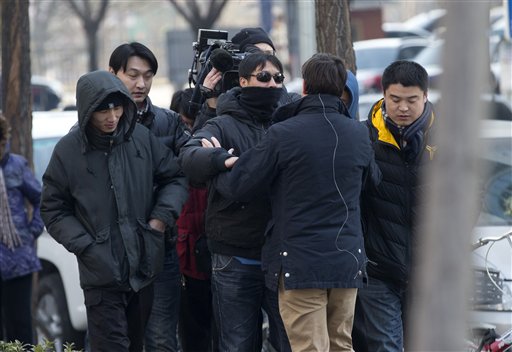
A foreign journalist, second right showing his back, is pushed away by a plainclothes policeman while he and his crew are covering a trial of legal scholar and founder of the New Citizens movement Xu Zhiyong near the Number 1 Intermediate People’s Court in Beijing Wednesday. AP
BEIJING, China—The founder of a grassroots movement to boost accountability for Chinese officials went on trial Wednesday on charges of disrupting public order but didn’t utter a word during the six-hour, closed-door proceedings to protest what he considers an unjust case, his lawyer said.
The trial of legal scholar and New Citizens founder Xu Zhiyong reflects the determination of the government led by Xi Jinping to quash the loosely knit activists before they can challenge Communist Party rule, even though their goals largely overlap with the party’s stated drive to root out corruption and build a fairer society.
The court did not set a date for the verdict. Xu’s lawyer, Zhang Qingfang, said a conviction is almost certain, and that prosecutors suggested five years in prison, the maximum sentence for the crime of gathering crowds to disrupt order in a public place.
Both Xu and his lawyers stayed silent in court.
“When the court becomes a venue of persecution, non-cooperation becomes an obligation,” Beijing-based political commentator and columnist Mo Zhixu said.
Xu has participated in small public rallies that, among other issues, have called for officials to declare their assets as a way of curbing graft—something party leaders have expressed a willingness to consider but have resisted while pushing a high-profile corruption crackdown.
The proceedings opened the same day that a United States-based journalist group released a report linking relatives of Xi and other political leaders to offshore tax havens, renewing allegations that the Communist elite has benefited from China’s economic boom and hidden the proceeds overseas.
Since April 2013, authorities have detained about 17 people linked to the New Citizens movement, putting three of them on trial in the southeastern province of Jiangxi in late 2013. No verdict has been issued in the Jiangxi trials.
Wednesday’s trial of Xu opened a second round of prosecution. At least six other activists are to appear in court in the following days in Beijing, and political and legal observers believe all will be found guilty and jailed for several years.
The U.S. Embassy in Beijing on Wednesday called for Xu’s immediate release, saying the prosecution is “retribution for his public campaign to expose official corruption and for the peaceful expression of his views.”
Chinese Foreign Ministry spokesman Qin Gang told a daily briefing Wednesday that Xu’s case is being handled in accordance with the law and is “a manifestation of China’s rule of law and judicial independence.”
The charges against Xu stem from public gatherings at which activists unfurled banners calling for asset disclosures or equality in education.
“If it is a crime to demand a clean government, to ask officials to declare assets, and to demand equality in education, then how can this country have equality and justice?” said Du Guowang, an activist for education equality with no link to the movement. “This government has no confidence, but is fearful.”
A conviction of Xu and other activists could motivate more people to take up civic activism, Du said. “People will no longer have any illusion about this government,” he said.
Willy Lam, a political scientist at the Chinese University of Hong Kong, said the New Citizens group drew the attention of authorities partly because the movement had adherents in several provinces.
“The government has no rational reason to arrest them, to prosecute these people,” Lam said. “But it is seen as a threat to political stability. It has a cross-provincial network, and that’s a big no-no.”
A large group of police—in uniform and plainclothes—prevented reporters and Xu’s supporters from getting near the courthouse, and were seen hauling people away.
More than a dozen diplomats from the U.S., European Union, Britain, Canada and Australia turned up to attend the trial but were told the courtroom was too small to accommodate them, according to the diplomats.
State media have alleged that the movement aims to overthrow the government. “They want to forcibly change or even subvert China’s basic political system,” an editorial in the state-run nationalist newspaper Global Times said last month.
Maya Wang, a researcher at Human Rights Watch, said the suppression of New Citizens has for now chilled the community of activists in China. “I would describe this as a heavy blow on the activist community,” she said.
In the report Wednesday by the U.S.-based International Consortium of Investigative Journalists, the group said it obtained documents showing the identities of nearly 22,000 owners of companies and trusts in the British Virgin Islands and other offshore centers. It said they include Xi’s brother-in-law, former Premier Wen Jiabao’s son and son-in-law and relatives of other ruling party figures.
RELATED STORY
China defends human rights record